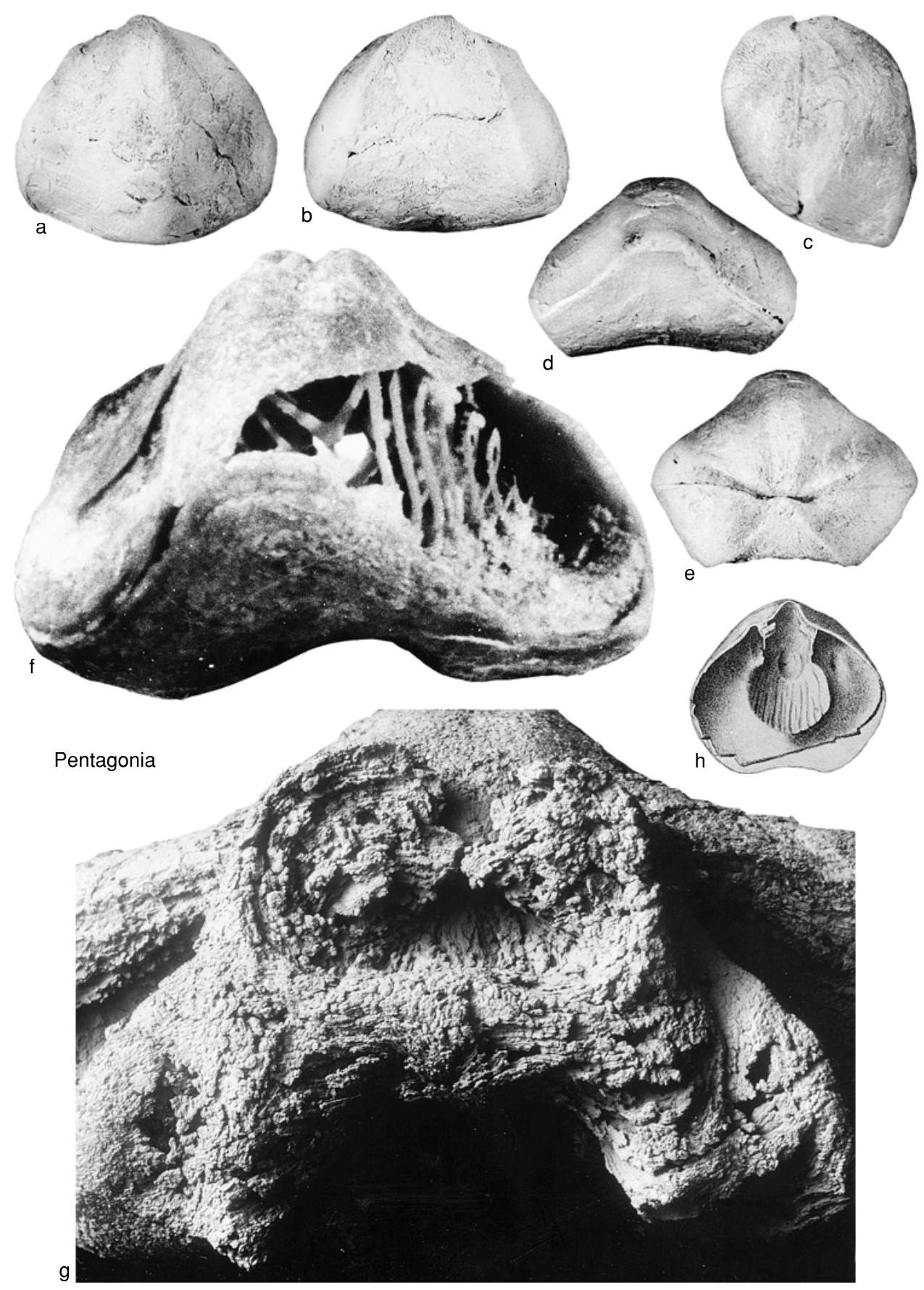Welcome to the Treatise on Invertebrate Paleontology!
Please enter a genera name to retrieve more information.

Pentagonia
Classification
Phylum:
Brachiopoda
Subphylum:
Rhynchonelliformea
Class:
Rhynchonellata
Order:
Athyridida
Suborder:
Athyrididina
Superfamily:
Meristelloidea
Family:
Meristellidae
Subfamily:
Meristellinae
Formal Genus Name and Reference:
Pentagonia COZZENS, 1846, p. 158
Type Species:
P. peersii, OD
Images
(Click to enlarge in a new window)
Fig. 1065 a-e . * P. peersii, Emsian, Kentucky, USA, dorsal, ventral, lateral, anterior, and posterior views, AMNH 37546, Hall collection, × 1.5 (new)., ——Fig. 1065 f-h. P. unisulcata (Conrad), Middle Devonian, New York, USA, f, anterior view of broken specimen showing part of spiralium and jugum, I1722, Hall collection, × 5 (new), g, ventral view of cardinalia, I1721, Hall collection, × 14 (new), h, ventral valve interior, × 1 (Hall & Clarke, 1895).
Synonyms
Goniocoelia
Geographic Distribution
North America, Colombia, Venezuela
Age Range
Beginning Stage in Treatise Usage:
Lower Devonian (Emsian)
Beginning International Stage:
Emsian
Fraction Up In Beginning Stage:
0
Beginning Date:
410.51
Ending Stage in Treatise Usage:
Middle Devonian
Ending International Stage:
Givetian
Fraction Up In Ending Stage:
100
Ending Date:
378.9
Description
Bi- to dorsibiconvex shells, pentagonal to hexagonal outline, ventral valve with a very broad sulcus bounded by angular divergent carinae, lateral slopes abrupt, dorsal valve with a broad, rounded fold commonly with a narrow medial groove, 2 narrow folds could develop in the posterolateral region of the dorsal valve, ventral muscle impression essentially as in Meristella, dental plates short, low dorsal median septum continuing posteriorly as a faint median ridge on a massive cardinal plate arising vertically from the bottom of the valve so as to present an erect, concave anterior face, top of plate extended posteriorly as a scoop-shaped concavity, jugal stem without bifurcations.
References
Museum or Author Information
Classification
Phylum:
Brachiopoda
Subphylum:
Rhynchonelliformea
Class:
Rhynchonellata
Order:
Athyridida
Suborder:
Athyrididina
Superfamily:
Meristelloidea
Family:
Meristellidae
Subfamily:
Meristellinae
Formal Genus Name and Reference:
Pentagonia COZZENS, 1846, p. 158
Type Species:
P. peersii, OD
Images
(Click to enlarge in a new window)
Fig. 1065 a-e . * P. peersii, Emsian, Kentucky, USA, dorsal, ventral, lateral, anterior, and posterior views, AMNH 37546, Hall collection, × 1.5 (new)., ——Fig. 1065 f-h. P. unisulcata (Conrad), Middle Devonian, New York, USA, f, anterior view of broken specimen showing part of spiralium and jugum, I1722, Hall collection, × 5 (new), g, ventral view of cardinalia, I1721, Hall collection, × 14 (new), h, ventral valve interior, × 1 (Hall & Clarke, 1895).
Synonyms
Goniocoelia
Geographic Distribution
North America, Colombia, Venezuela
Age Range
Beginning Stage in Treatise Usage:
Lower Devonian (Emsian)
Beginning International Stage:
Emsian
Fraction Up In Beginning Stage:
0
Beginning Date:
410.51
Ending Stage in Treatise Usage:
Middle Devonian
Ending International Stage:
Givetian
Fraction Up In Ending Stage:
100
Ending Date:
378.9
Description
Bi- to dorsibiconvex shells, pentagonal to hexagonal outline, ventral valve with a very broad sulcus bounded by angular divergent carinae, lateral slopes abrupt, dorsal valve with a broad, rounded fold commonly with a narrow medial groove, 2 narrow folds could develop in the posterolateral region of the dorsal valve, ventral muscle impression essentially as in Meristella, dental plates short, low dorsal median septum continuing posteriorly as a faint median ridge on a massive cardinal plate arising vertically from the bottom of the valve so as to present an erect, concave anterior face, top of plate extended posteriorly as a scoop-shaped concavity, jugal stem without bifurcations.
